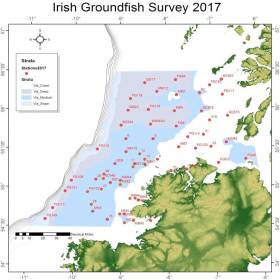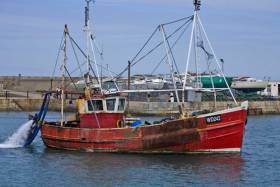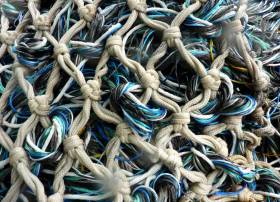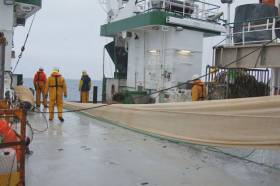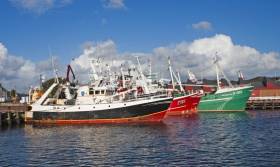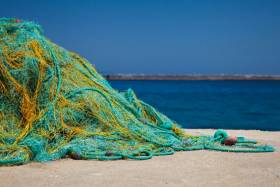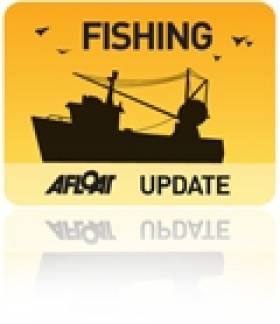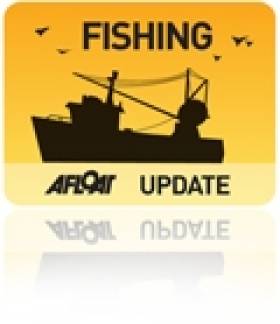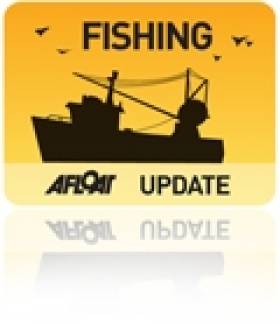Displaying items by tag: CFP
Groundfish Survey Off North West Coast This October
#MarineNotice - The Marine Institute advises that the annual Irish Groundfish Survey (IGFS2017) will be carried out off the North West Coast of Ireland between Tuesday 3 and Saturday 14 October, in fulfilment of Ireland’s Common Fisheries Policy obligations.
The IGFS is a demersal trawl survey consisting of approximately 45 fishing hauls of 30 minutes duration each in ICES area VIa. Fishing in 2017 will take place within a two nautical mile radius of these 45 positions, the approximate locations of which are noted in Marine Notice No 39 of 2017.
The survey will be conducted by the RV Celtic Explorer (Callsign: EIGB), which will display all appropriate lights and signals during the survey and will also be listening on VHF Channel 16. The vessel will be towing a high headline GOV 36/47 demersal trawl during fishing operations.
This survey is to determine the relative annual abundance and distribution of commercially exploited fish stocks, in particular assessment of recent recruitment. In addition, other species of national importance are sampled along with physical and chemical oceanographic parameters.
The Marine Institute requests that commercial fishing and other marine operators keep a two nautical mile area around the tow points clear of any gear or apparatus during the survey period outlined above.
While there is no statutory provision for the loss of gear at sea, the Marine Institute will make every effort to avoid gear, adequately marked according to legislation, that may be encountered in the notified areas. In the event that an operator has static gear or other obstructions within 2nm of the trawl points, it is the responsibility of the owner to notify the survey managers or vessel directly.
This should be communicated by identifying specifically which ‘Prime Station’ is of concern using the appendix and contact details provided in Marine Notice No 39 of 2017, a PDF of which is available to read or download HERE.
It is not required to provide positional details of commercial operations beyond 3-4nm of the survey points provided. Specifics of any fishing gear or other obstructions that are known and cannot be kept clear of these survey haul locations can be notified using the contact details provided in the above Marine Notice.
Britain’s Withdrawal From Fisheries Convention Could Be ‘Catastrophic’ For Irish Fleet
#Brexit - Britain’s withdrawal from the London Fisheries Convention could be “catastrophic” for the Irish fishing fleet — with fishermen in Northern Ireland being the “big losers” in the end.
That’s the stark warning from fisheries organisations noted in Independent.ie’s rundown of ‘the five things you need to know as the UK backs out of the EU fishing deal’.
As previously reported on Afloat.ie, Irish trawlers could soon face a ban from fishing within 12 nautical miles of the UK as ministers in Westminster prepare to trigger Britain’s withdrawal from the 53-year-old London Fisheries Convention.
The agreement, which grants fishing rights to European countries — including Ireland — that have traditionally fished in British waters for centuries, was incorporated into the Common Fisheries Policy more than 30 years ago.
However, Brexit means the UK’s exit from the CFP and an intention to reassert control over its fishing waters.
The affect for Ireland could be the wiping out of the Irish fishing industry, fears Patrick Murphy of the Irish South and West Fish Producers Organisation (IS&WFPO), who explains that as much as 50% of the Irish catch comes from English waters.
And Northern Irish fishermen would be “big losers” after such a move, says Francis O'Donnell of the Irish Fish Producers Organisation (IFPO) — with no specifics on how common fishing grounds such as Lough Foyle and Carlingford Lough would be handled.
Meanwhile, UK Environment Secretary Michael Gove claims that leaving the convention would give Britain the power to build a new domestic fishing policy “which leads to a more competitive, profitable and sustainable industry”.
But the WWF warns that making its own decisions is not enough for Britain to support its fishing industry.
“Achieving sustainable fishing is about a lot more than which country fishes where,” said the environmental NGO’s Ben Stafford, who added: “We will still need to co-operate with our neighbours, as fish do not recognise lines on a map.”
Independent.ie has much more on the story HERE.
Irish Fleet Could Face UK Ban With Britain’s Withdrawal From Longstanding Fisheries Agreement
#Fishing - Irish trawlers could soon be banned from fishing within 12 nautical miles of the UK after its exit from an agreement to share its waters with other European maritime countries.
According to The Irish Times, Britain announced at the weekend that it would trigger its withdrawal from the 53-year-old London Fisheries Convention as part of Brexit.
The convention was signed in 1964 with France, Belgium, Germany, the Netherlands and Ireland to allow fishing in waters that have been traditionally shared for centuries.
Rights granted by the convention were incorporated into the European Union’s Common Fisheries Policy in 1983.
But as negotiations for Britain’s withdrawal from the EU begin, the UK has also triggered its exit from the longstanding convention — a move described by Irish Marine Minister Michael Creed as “unwelcome and unhelpful”.
The Irish fleet sources the majority of its mackerel catch and most of its prawns from UK waters, the minister added.
Irish fishing industry organisations, meanwhile, have branded the decision as Britain’s “first serious shot on Brexit”.
Both the Irish South and West Fish Producers Organisation (IS&WFPO) and Killybegs Fishermen’s Organisation (KFO) say the move is proof the that UK is seeking a ‘hard’ Brexit when it comes to fishing rights, as The Irish Times reports.
The news comes just days after Minister Creed said there was ‘strength in unity’ when it comes to pending Brexit fisheries negotiations.
Annual Irish Groundfish Survey Now Under Way
#Fishing - The Marine Institute’s annual Irish Groundfish Survey (IGFS2016) began off the North West Coast on Sunday 25 September, continuing till Thursday 6 October, in fulfilment of Ireland’s Common Fisheries Policy obligations.
IGFS2016 is a demersal trawl survey consisting of a minimum of 45 fishing hauls each of 30 minutes’ duration. Fishing in 2016 is taking place within a two-nautical-mile radius of positions indicated in Marine Notice No 41 of 2016, available to read or download HERE.
The survey is being conducted by the RV Celtic Explorer (Callsign EIGB), which will display all appropriate lights and signals throughout and is also listening on VHF Channel 16.
The Celtic Explorer will be towing a high headline GOV 36/47 demersal trawl during fishing operations. The Marine Institute requests that commercial fishing and other marine operators keep a two-nautical-mile area around the tow points clear of any gear or apparatus during the survey period outlined above.
While there is no statutory provision for the loss of gear at sea, the Marine Institute will make every effort to avoid gear adequately marked according to legislation that may be encountered in the notified areas.
In the event that an operator has static gear or other obstructions within 2nmi of the haul points, it is the responsibility of the owner to notify the survey managers or vessel directly.
This should be communicated by identifying specifically which ‘Prime Station’ is of concern using the appendix and contact details provided.
It is not required to provide positional details of commercial operations beyond 3-4nmi of the survey points provided. Specifics of any fishing gear or other obstructions that are known and cannot be kept clear of these survey haul locations can be notified using the contact details provided in the Marine Notice.
#Brexit - Britain's exit from the EU could create an opportunity for north Atlantic coastal countries to form their own economic group, according to a leading Irish fishing industry figure.
Speaking to The Irish Times, Irish Fish Producers Organisation (IFPO) CEO Francis O’Donnell said there was sympathy within the industry for Brexit due to the impact of Common Fisheries Policy quotas on their livelihoods.
New markets in South America, Asia and the Middle East could also replace any loss of access to the crucial EU common market, O'Donnell suggested, if Ireland were to "become a global player" and band together with the UK, Iceland and Norway.
Such sentiment within Ireland's fishing communities runs against the current of the majority of Ireland's farming sector, with the IFA urging Irish in the UK to vote to remain in the EU.
The Irish Times has more on the story HERE.
#Fishing - Marine Minister Michael Creed today (Wednesday 1 June) met with the leaders of Irelands’ fish producer and exporting organisations to discuss various issues including the commitment under the Programme for Government to dealing with the issue of penalty points for serious infringements of the Common Fisheries Policy.
Minister Creed said that the meeting was “a very positive engagement and that he looked forward to working closely with all of the organisations on both the challenges and the opportunities for Ireland’s fisheries sector over the coming years.”
The minister discussed a wide range of issues with industry representatives and, in particular, their concerns in relation to the implementation of the CFP penalty points system.
On this matter, he confirmed that upon taking office he requested that the Attorney General consider whether there is a way that the assignment of EU points for licence holders can await the completion of the prosecution process, while at the same time ensuring that Ireland is fully in compliance with its obligations under EU law.
"Further to the Programme for Government commitment pertaining to the assignment of penalty points, I quickly sought advice from the Attorney General as prescribed in the document," he said. "Having now received this advice, I am satisfied to move on the introduction of a system for the sequential application of EU points in conjunction with the prosecution process, thus fulfilling the ambition outlined in the Partnership Programme."
The minister acknowledged that this move was subject to addressing some important legal and administrative issues in order to ensure compliance with EU law.
“I have today listened to the concerns of industry and intend to report back to the Oireachtas as soon as I have finalised a way forward in the context of dealing with legal and administrative matters that are arising," he added.
"However I am confident that these matters can be dealt with in a collaborative and constructive manner with all stakeholders.”
Among the other topics covered in today’s meeting were the potential impacts of ‘Brexit’ on the Irish fishing industry, the ongoing phasing in of the landing obligation or ‘discards ban’ under the new Common Fisheries Policy, the herring fishery off the North West coast, EU funding, decommissioning of fishing vessels, negotiations with Norway and the Faroe Islands, and the Killybegs Fisheries Harbour Centre.
“Today’s meeting was all about getting a deeper understanding of the issues facing the Irish fishing industry and I very much appreciated the positive engagement with industry leaders," the minister concluded.
Galway Fishermen To Get CFP Funds While Jellyfish Cause Salmon Losses
#Fishing - Galway fishermen will be among those in receipt of a €6.5 billon aid package to help Europe's fleets comply with the discard ban under the reformed Common Fisheries Policy that was approved by the European Parliament this week.
Galway Bay FM says the funding will go towards the purchase of more advanced selective fishing gear and improving safety on board fishing vessels, as well as updating port infrastructure.
Meanwhile, Galway Bay FM also reports that losses at salmon farms on the west coast are being attributed to attacks by jellyfish.
Bord Iascaigh Mhara (BIM) says the mauve stinger (Pelagia noctiluca), which normally inhabits the deep ocean and rarely comes inshore, has been getting into open cage salmon rearing stations.
CFP Reform Reaches Final Hurdle In Brussels
#CFP - RTÉ News reports that the "final battle" before reform of the Common Fisheries Policy (CFP) comes up today as a European Parliament committee votes on the changes led by the Irish Presidency of the EU in the first half of this year.
As previously reported on Afloat.ie, Europe's fisheries ministers agreed in May to a new policy that sets quotas based on scientific advice, with the aim of achieving healthy fish stocks and ultimately higher quotas as stocks are managed sustainably.
The reforms were pushed by Marine Minister Simon Coveney during his presidency of the EU Fisheries Council. The minister also made as his priority the ending of the practice of fish discards, a subject of much public outcry following revelations that as much as 50% of the catch in the North Sea is thrown back dead in the water.
Meanwhile, Ireland's additional quotas under the Hague Preferences have also been retained, a move that comes as some relief to the Irish fishing industry - which will also benefit from CFP amendments that would support the renewal of older fishing fleets.
However, conservation groups fear that these proposals would see the EU's fishing fleets grow to a size that far exceeds the available fisheries resource in European waters.
Fish Discards Should End 'Within Six Years' Says Coveney
#CFP - The deal reached between EU fisheries ministers this morning on reform of the Common Fisheries Policy (CFP) should bring an end to the practice of fish discards within the next six years, according to Ireland's Marine Minister.
As reported earlier today on Afloat.ie, Minister Simon Coveney emerged from 36 hours of talks in Brussels confident that a far-reaching reform on fisheries policy had been reached.
RTÉ News reports that the compromise deal will see a 93% ban on discards take immediate effect, phasing towards a full ban by 2019, with special allowances made in certain cases where sustainability of fish stocks allows.
Minister Coveney, as president of the EU Council of Fisheries Ministers during Ireland's EU presidency, will submit the agreed reforms to the European Parliament - which has previously been steadfast in its demands for a complete ban on fish discards to halt the depletion of fish stocks in European waters.
As previously reported on Afloat.ie, this week's discussions on fisheries reform in Brussels have been described as a "once-in-a-decade opportunity" to end the wasteful practice of fish discards, which has seen as much as 50% of the catch in the North Sea is thrown back overboard dead.
#CFP - 'Fight Fight' campaigner Hugh Fearnley-Whittingstall writes on the Guardian's Comment Is Free blog that this week's upcoming discussions among the EU's fisheries ministers is a "once-in-a-decade opportunity" to end the practice of fish discards.
The TV chef, who has long campaigned against the practice of discarding fish in Europe's seas under the quota system implemented by the Common Fisheries Policy (CFP), hopes that this week's discussions among EU ministers over the final text to submit to the European Parliament includes "a proper discard ban - one that will finally eliminate the disgraceful waste of fish that occurs under the current system".
Though all parties involved have agreed in principle to ban discards, Fearnley-Whittingstall believes "we're in the endgame: a tussle between the parliament and the ministers over the final shape of the new CFP" - with "powerful fishing countries such as France and Spain happier to see the current broken system continue, rather than deal with the awkward aspects of transforming their fisheries into a sustainable, profitable and growing sector".
As previously reported on Afloat.ie, Ireland's Marine Minister Simon Coveney - president of the EU Council of Fisheries Ministers - is pushing for ministers to focus on the most critical elements such as fish discards in their discussions on CFP reform in Brussels from tomorrow 13 May.


























